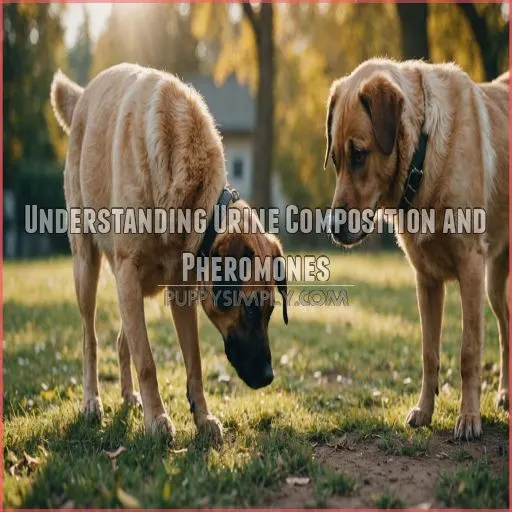This site is supported by our readers. We may earn a commission, at no cost to you, if you purchase through links.
 Your dog’s penchant for licking other pups’ pee may seem a bit gross, but it’s actually a natural canine instinct! Dogs use urine as a "pee-mail" system, sniffing out info about their furry friends’ identity, health, and social status.
Your dog’s penchant for licking other pups’ pee may seem a bit gross, but it’s actually a natural canine instinct! Dogs use urine as a "pee-mail" system, sniffing out info about their furry friends’ identity, health, and social status.
By licking that yellow gold, your dog’s getting a whiff of important pheromones and chemicals that reveal all sorts of juicy details.
Just be mindful – while it’s a normal behavior, licking pee can expose your pup to nasty bugs and parasites. Keep an eye out, provide plenty of fresh water, and you’ll strike the perfect balance between letting your dog indulge their curiosity and keeping them safe and healthy.
Table Of Contents
- Key Takeaways
- Why Dogs Lick Other Dogs’ Pee
- Health Risks of Licking Other Dogs’ Pee
- Understanding Urine Composition and Pheromones
- Training and Prevention Methods
- Addressing Vomiting and Stomach Irritation
- The Role of the Vomeronasal Organ
- Balancing Natural Instincts and Health Risks
- Frequently Asked Questions (FAQs)
- Should I let my dog lick other dogs’ pee?
- What if my dog licks his pee?
- Can dogs get sick from smelling other dogs’ urine?
- Why does my dog lick other dogs’ privates?
- How can I remove urine stains from fur?
- Can licking cause bad breath in dogs?
- Does urine licking affect a dogs appetite?
- Are there long-term effects of urine licking?
- How do I clean a dogs mouth after licking?
- Conclusion
Key Takeaways
- Licking other dogs’ pee is a natural instinct for canines, helping them gather important information about their furry friends’ identity, health, and social status. It’s like reading a juicy gossip column for your pup!
- While this behavior is normal, it can expose your dog to nasty bugs and parasites like leptospirosis. Stay on top of vaccinations, provide fresh water, and keep an eye on those slobbery sniffs to strike the perfect balance between curiosity and safety.
- Your dog’s vomeronasal organ, or Jacobson’s organ, is like a secret detective gadget that analyzes the chemical composition of urine, including pheromones, bacteria, and sugars. This helps them decipher all sorts of canine clues, from dietary habits to reproductive status.
- To curb excessive urine-licking, practice training cues like "leave it" and reward good behavior. Distract your pup with toys or playtime, and supervise outdoor adventures to prevent exposure to risky puddles. With a little guidance, you can let your dog’s natural instincts shine while keeping them healthy and happy.
Why Dogs Lick Other Dogs’ Pee
Ever wondered why dogs can’t resist a good sniff and lick of another dog’s pee?
It’s their way of catching up on the latest "p-mail" – an instinctive behavior that helps them gather information about other dogs’ identities, social status, and health like scent marking.
Communication Tool for Dogs
In terms of dog communication, it’s like a cocktail party with no words, just scent signals.
Licking urine is like reading a novel for dogs.
They gather info about their peers through canine behavior, using their remarkable olfactory system.
Scent Marking and Recognition
Dogs, quite the communicative creatures, use urine as a postcard for scent marking and recognition. Their vomeronasal organ, or Jacobson’s organ, deciphers this "canine scent language."
- Territorial Behavior
- Urine Analysis
- Scent Communication
It’s a dog’s version of social media!
Health Indicators and Social Hierarchy
Urine scent acts like a social media update for dogs, revealing health clues and social status.
These pee-mails share dominance signals, aiding pack dynamics.
Don’t worry—dog instincts tell them who’s got a urinary tract infection and who’s fit as a fiddle.
Normal Canine Instinct and Natural Behavior
As natural-born sniffers, dogs can’t resist the urge to lick other pups’ pee – it’s their way of gathering intel on their canine companions.
This inquisitive behavior stems from their innate curiosity and social instincts.
Health Risks of Licking Other Dogs’ Pee
When your dog licks other dogs’ pee, they’re just being brilliantly nosy canines exploring a world with their super-powered nose.
However, every so often, this quirky habit can lead to them picking up nasty hitchhikers like the bacteria causing leptospirosis.
So it’s worth considering vaccination and keeping an eye on those slobbery sniffs.
Leptospirosis and Bacterial Diseases
Imagine your furry friend catching a nasty bacterial disease from licking another dog’s pee.
That’s leptospirosis, the uninvited guest at the dog park.
Prevent it by keeping up with canine vaccinations and being picky about water sources.
Your pup’s health is no joke!
Intestinal Parasites and Gastrointestinal Viruses
While leptospirosis grabs much attention, intestinal parasites pose their own risks.
Luckily, viruses usually don’t spread through urine.
Keep your dog’s gastrointestinal health in tip-top shape by sticking to a worming schedule and a balanced dog diet.
Prevention beats cure!
Rare Bladder Parasites and Uric Acid
While a rare bladder parasite called Capillaria plica can affect dogs, it’s not typically spread through urine.
Dogs licking urine may reveal insights about their health, like elevated uric acid levels requiring veterinary attention.
Importance of Vaccination and Deworming
You’ve got to love your pooch, right?
But pet health is no joke!
Regular dog vaccinations and sticking to a deworming schedule help reduce parasite risks.
Vet recommendations help your furry friend avoid leptospirosis.
Trust your dog vet for excellent dog care.
Understanding Urine Composition and Pheromones
When your dog sniffs and licks another dog’s pee, it’s like reading a morning newspaper filled with juicy details.
Urine isn’t just waste; it’s a cocktail of chemicals like pheromones, bacteria, and sugar that reveal secrets about other dogs’ diets, health, and more.
Components of Urine and Their Functions
Understanding the urine chemical composition holds the key to a dog’s scent communication.
A dog, in gathering metabolic byproducts in urine, explores:
- Sugars
- Uric acid
- Chemical signaling compounds
- Waste elimination factors
Imagine your dog with a detective’s curiosity!
Pheromones in Urine and Their Role
Picture your dog’s nose as a super-sleuth detective!
Pheromones in urine tell tales about a dog’s identity and reproductive status.
These scent molecules—critical to canine social scenting—guide dogs’ interactions through pheromone communication pathways, offering essential pheromonal mating cues.
| Pheromone Type | Function |
|---|---|
| Sex Pheromones | Identify gender and reproductive status |
| Territorial Markers | Establish territory boundaries |
| Health Indicators | Signal health and diet |
| Mating Signals | Indicate estrus and availability |
| Social Identity | Reflect social hierarchy and status |
Bacteria, Sugar, and Uric Acid in Urine
Urine isn’t just a smelly puddle. It’s a cocktail of bacteria, sugar, and uric acid.
Imagine a dog playing detective, licking another dog’s pee like it’s a mystery novel.
This chemical analysis helps dogs sniff out tales of thirst and tongue-tangling surprises.
How Dogs Identify Food, Estrous Cycle, and Infections
Ever wonder what secrets a dog discovers at the dog park by exploring those peculiar puddles?
By licking pee, dogs can decode:
- Identifying dietary components
- Detecting reproductive status
- Diagnosing health conditions
It’s like a scent-based detective kit with their vomeronasal organ!
Training and Prevention Methods
If your dog has a knack for licking other dogs’ pee, don’t worry—there are simple training methods to help manage this behavior.
From practicing cues like "leave it" to rewarding good behavior, these strategies can make your walks and playdates more pleasant.
Practice Cues and Positive Reinforcement
Practice cues like ""drop it" and ""leave it" to interrupt your dog’s urine-licking habit.
Reward good behavior with treats and praise – your pup will learn what you expect.
Try these simple training tricks to curb this natural instinct.
| Cue | Purpose | Reward |
|---|---|---|
| "Drop it" | Interrupt urine licking | Tasty treat |
| "Leave it" | Redirect attention | Enthusiastic praise |
| Playtime | Distract with fun activity | Cuddles and pets |
Redirecting Attention and Rewarding Good Behavior
How can you keep your curious canine from licking everything in sight?
Try some nifty training techniques! Distracting your dog with a squeaky toy or tasty treat works wonders.
Reinforce positive behavior, like avoiding that tempting puddle, with praise and extra cuddles.
Supervising Walks and Playdates
While strolling with your pup, keep a watchful eye – you never know when they might get a whiff of that tantalizing tinkle.
Stay alert and guide them away from any tempting tinkles, ensuring a safe and enjoyable outing for all.
Preventing Urine Licking and Health Risks
To prevent your dog from licking urine, steer clear of risky waters like stagnant ponds.
Use effective leash control techniques, ensuring safe interactions with other dogs.
Monitor their behavior closely, aiding their immune system and keeping them healthy and happy.
Addressing Vomiting and Stomach Irritation
If your dog licks another dog’s pee, it might occasionally lead to vomiting due to the urine’s acidity or unpleasant taste.
Don’t panic—some dogs have delicate stomachs, and you can help them feel better by monitoring their behavior and making sure they stay hydrated, with a vet visit if vomiting continues.
Acidity and Unpleasant Taste of Urine
When training your dog, watch out for their digestive system sensitivity to urine’s acidity.
It can lead to stomach irritation or taste aversion.
Pay heed to these palatability concerns by:
- Providing fresh water
- Encouraging healthy habits
- Monitoring behavior
- Consulting veterinarians
Individual Sensitivity to Urine Licking
Not every dog handles the pee-licking hobby the same way.
Behavioral differences mean some might gag or hurl. Digestive responses vary due to genetic predispositions or sensory thresholds.
Blame it on environmental factors if your pup reacts more dramatically than others to genetic predispositions or environmental factors.
Monitoring and Prevention of Vomiting
Occasionally, you might notice your dog vomiting after some adventures in pee-licking territory. Don’t fret!
By keeping an eye out for common vomiting triggers and considering:
- Dietary adjustments
- Dehydration risks
- Stomach soothing techniques
you can help prevent episodes.
Providing Fresh Water and Seeking Professional Advice
Make certain your pup stays hydrated by providing fresh water regularly.
If vomiting persists or worries you, consult your vet – they can pinpoint the cause and recommend the best way to keep your furry friend feeling their best.
The Role of the Vomeronasal Organ
Dogs have a special organ called jacobson’s organ that analyzes large molecules like pheromones and bacteria when they lick other dogs’ pee.
This helps them gather important info about their surroundings and other dogs,
making them the ultimate neighborhood detectives!
Jacobson’s Organ and Its Function
Now, about Jacobson’s organ. Think of it as your dog’s secret detective gadget for scent perception and pheromone detection.
This olfactory organ:
- Enhances chemical analysis.
- Boosts olfactory communication.
- Helps decode pheromones.
- Connects smells to social cues.
It’s a handy tool!
Analyzing Large Molecules and Compounds
The vomeronasal organ’s function is like your dog’s personal lab, where scent analysis and chemical communication take place. Imagine it as a molecular analysis hub:
| Process | Compound Type | Purpose |
|---|---|---|
| Pheromone Detection | Large Molecules | Social Interaction |
| Molecular Analysis | Bacteria | Health Indicators |
| Scent Analysis | Hormones | Mating Signals |
| Chemical Communication | Food Particles | Dietary Information |
Information Transmission to the Dog’s Brain
After analyzing large molecules, the vomeronasal organ sends scent-packed brain signals, like a canine courier dispatching a message.
This complex scent analysis involves:
- Pheromone interpretation to understand fellow dogs.
- Sensory integration for environmental clues.
- Enhancing your pup’s natural instincts.
Importance in Mating, Social Interactions, and Hunting
Understanding urine scents isn’t just data collection for dogs; think of it as Facebook for the canine world.
Their vomeronasal organ helps manage scent marking, establish dominance hierarchy, and even assist in mate selection.
It’s sniffing with purpose, conveying sophisticated canine communication skills!
Balancing Natural Instincts and Health Risks
Balancing your dog’s natural instincts with potential health risks is like teaching a teenager to drive—it’s all about guidance and prevention.
While letting your pup indulge in their natural behavior isn’t always harmful, it’s wise to make sure you have regular vet check-ups and keep those leptospirosis vaccinations up to date.
Allowing Dogs to Lick Urine in Peace
Licking urine is a dog’s natural instinct, so let them indulge!
Just keep an eye out and redirect their attention if needed. Your pup’s curiosity is part of their charm – embrace it (within reason)!
- Monitor closely during walks and playdates.
- Reward your dog for ignoring urine.
- Provide plenty of engaging toys and activities.
- Consult your vet if you have concerns.
Minimizing Risks of Leptospirosis and Other Diseases
While it’s okay to let dogs lick urine undisturbed, ensuring they stay healthy is key. Vaccination, leash walks away from puddles, and knowing dog friends’ health help. Better safe than sorry, so keep those tails wagging and sniffers sniffing happily!
| Risk | Prevention | Why It Matters |
|---|---|---|
| Leptospirosis | Dog vaccination | Keeps serious illness away |
| Unknown health dogs | Healthy dog park | Play with healthy friends |
| Contaminated water | Safe water sources | Avoids sickness |
| Urine-licking risks | Vigilance during walks | Reduces exposure to diseases |
| Herd immunity | Community health | Protects all pups |
Providing Fresh Water and Regular Veterinary Check-Ups
To trim down the risk of leptospirosis, offer your dog fresh water often and schedule regular vet check-ups.
Keep your furry friend’s tail wagging with these tips:
- Maintain a balanced and healthy diet.
- Practice parasite prevention diligently.
- Prioritize overall canine wellness.
Ensuring a Healthy and Balanced Lifestyle for Dogs
Regular vet visits and balanced dog food keep your furry friend’s health on track.
Daily exercise boosts happiness, while engaging training enhances their natural instincts.
Ensuring proper grooming means fewer fur-tantrums.
These steps help strike a balance between instincts and health risks.
Frequently Asked Questions (FAQs)
Should I let my dog lick other dogs’ pee?
Letting your dog lick other dogs’ pee is like letting them sniff out the neighborhood gossip column.
It’s natural and mostly harmless, just make sure they’re up-to-date on vaccinations.
If it makes them sick, it’s time for a vet visit.
What if my dog licks his pee?
When your dog licks his own pee, it’s their way of gathering information about themselves—like reading their own diary.
While it’s normal and harmless, keep an eye out for excessive behavior or any signs of discomfort.
Can dogs get sick from smelling other dogs’ urine?
While your pup’s pee-sniffing antics may seem peculiar, it’s their way of gathering intel on their canine comrades.
Just keep an eye out for any telltale signs of sickness, and you’ll both be barking up the right tree.
Why does my dog lick other dogs’ privates?
Your dog’s licking other dogs’ privates is natural, helping them socialize, gather information, and bond.
Think of it like reading a canine newspaper.
It’s important for communication, providing insights into health and social status (Source).
How can I remove urine stains from fur?
Got a pee-stained pup?
Channel your inner chemist and mix dog shampoo with a splash of white vinegar.
Lather, rinse thoroughly, and watch that fur gleam!
It’s easier than juggling flaming chainsaws while blindfolded.
Can licking cause bad breath in dogs?
Licking foreign substances can add a stinky note to your dog’s breath, just like a bad song stuck on repeat.
Keep an eye on your furry friend since ingesting that odor may point to underlying issues.
Does urine licking affect a dogs appetite?
Licking urine doesn’t typically affect a dog’s appetite, but it could lead to vomiting if the taste or smell upsets their stomach.
Keep an eye on your pup and consult your vet if you notice any changes in their eating habits.
Are there long-term effects of urine licking?
Imagine a curious researcher exploring the scent-laden universe.
Despite the intriguing expedition, urine licking usually doesn’t lead to long-term issues.
Make sure to schedule regular vet check-ups to catch any potential health hiccups down the road.
How do I clean a dogs mouth after licking?
After your dog’s been on a "festive foray", wipe their mouth with a damp cloth or offer them fresh water.
You might give a dog-safe dental chew to freshen those curious chompers, ensuring everything’s hunky-dory.
Conclusion
Imagine your dog deciphering secrets from the neighborhood with a mere sniff and lick of other dogs’ pee. This quirky habit is their natural way of understanding canine hierarchies and health. Your furry friend benefits from using this instinctive behavior, but it comes with health risks like leptospirosis.
So, let them follow their instincts while ensuring their safety. Offer fresh water, supervise outdoor adventures, and consult your vet. Embrace their instincts and keep them healthy!













